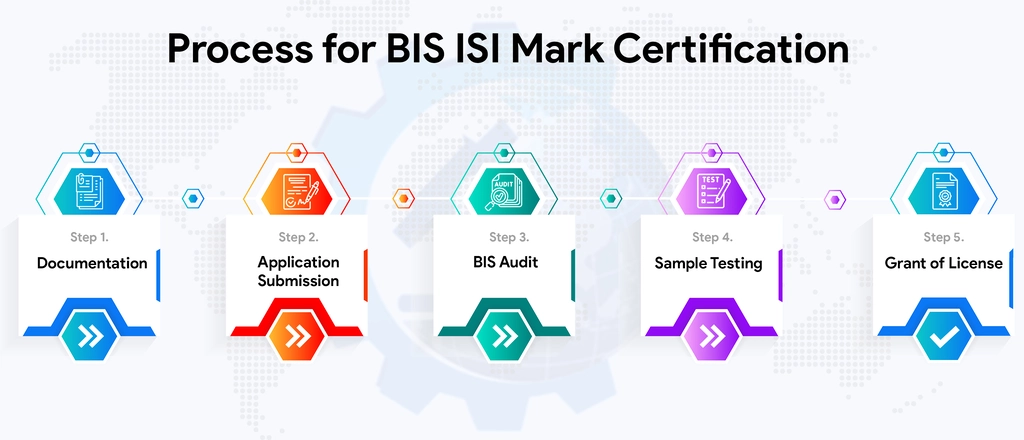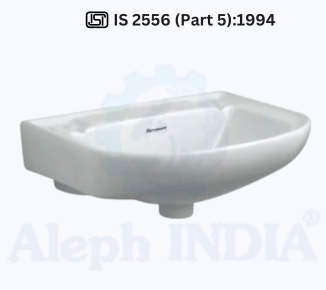BIS CERTIFICATION for vitreous sanitary appliances (vitreous china): Part 5 Specific requirements of laboratory sinks IS 2556 (Part 5):1994
Published Date: November 05, 2024 4 min Read
Introduction
IS 2556 (Part 5) 1994 is an Indian standard that establishes special requirements for laboratory-type laboratory sinks, which are glass sanitary equipment under BIS certification. These ceramic products are a prerequisite in hospitals, laboratories, and other educational institutions due to their exceptional cleaning and durability characteristics. The product must meet the quality standards set by the (Bureau of Indian Standards) (BIS) to obtain BIS certification. An ISI mark is an essential milestone for market acceptance and compliance.
Manufacturers can make online applications to seek BIS certification if they want their products to meet national quality benchmarks. BIS certification facilitates smooth customs clearance for businesses importing these products. Although there are fees associated with compliance to QCO orders and obtaining BIS certification, the issuance of BIS licenses enhances manufacturers' confidence in marketing their glass sanitary equipment both in India and abroad.
OVERVIEW
IS 2556 (Part 5):1994 This standard specifies requirements for vitreous laboratory sinks. The size, shape, finish, and construction shall comply with the provisions of this standard. The sink shall be in one piece and have an overflow where necessary. It shall not be smaller than the sizes specified. This Indian Standard includes IS 254:1981, IS 551:1987, and IS 983:1988. Such sinks are durable, safe, and hygienic for use in laboratories.
Key highlights
| Product Name | Ceramic Tiles, Sanitary Wares, and Laboratory Wares (Vitreous Sanitary Appliances (Vitreous China) -Specific Requirements of laboratory sinks) |
| Applicable Indian Standard | IS 2556 (Part 5):1994 |
| Applicable Certification Scheme | Product Certification Scheme (ISI Mark Scheme) Scheme 1 |
| Applicable Mark: | BIS Standard Mark (ISI Logo) |
| Compliance Requirement | Mandatory |
| Quality Control Order | Click here |
| Ministry | MINISTRY OF COMMERCE AND INDUSTRY |
| Scope as per Standard | This standard (Part 5) covers the general requirements for sizes, dimensions, finish, and construction for the vitreous laboratory sinks. |
| Major Country of Import | Various countries including China, Italy, and the USA, depending on market demand and sourcing. |
Applicable Tests
Mandatory Tests:
- Glazing
- Lead content (in case colouring oxides containing lead is used)
- Permissible blemishes or defects
- Minimum thickness
- Warpage
Optional Tests:
- Material and Manufacture

Note
For Detailed Information about the Procedure for BIS ISI Certification, Visit :
Timeline for BIS Certification
The approximate timeline to obtain BIS certification for Ceramic Tiles, Sanitary Wares, and Laboratory Wares (Vitreous Sanitary Appliances (Vitreous China) -Specific Requirements of laboratory sinks) IS 2556 (Part 5):1994 is as follows:
- For Indian Manufacturers (Standard Timeframe – 30 days)
- For Foreign Manufacturers (Standard Timeframe – 180 days)
Benefits of BIS Certification
BIS certification enhances product credibility, increases consumer confidence, expands market reach, and provides a competitive edge to manufacturers.
| Benefit | Description |
|---|---|
| Access to Indian Market | Mandatory for many products, facilitating trade. |
| Compliance with Indian Standards | Ensures adherence to safety and quality norms. |
| Enhanced Product Credibility | Signifies quality assurance, helping products stand out. |
| Increased Customer Trust | Consumers prefer certified products for safety and performance. |
| Benefits for MSMEs | Small and medium enterprises gain competitive advantage and access to government tenders. |
Conclusion
BIS certification is a strategic asset for quality assurance and market growth in India. ALEPH INDIA helps manufacturers achieve this crucial verification.
Aleph INDIA has been serving the industry as a single-window operator for all product regulatory compliance. We can assist importers or manufacturers in meeting all criteria for importing or selling a product in the Indian market.
Frequently Asked Questions
International Audits & Participation
Testimonials
BIS REGISTRATION FOR ELECTRONIC & IT PRODUCT
In the era of globalization, world trade is growing rapidly and henceforth, Manufacturing and Import/Export businesses are also growing drastically...View More
BIS CERTIFICATE FOR FOREIGN MANUFACTURER
The Economy of India-the fastest developing economy on the globe with the capabilities that help it matches up with the biggest international...View More
PRODUCT CERTIFICATION SCHEME (ISI MARK) FOR DOMESTIC MANUFACTURERS
Anything a person buys from food to cars, clothes to electronics, branded to unnamed products there is always a question that wanders in one’s...View More
WIRELESS PLANNING AND COORDINATION (WPC)
WPC: Wireless means communication done from one point to another point without the wires and cables. Electromagnetic waves carry the ...View More
BUREAU OF ENERGY EFFICIENCY (BEE) CERTIFICATE
BEE CERTIFICATE: Energy is the future, and its conservation is the way of the bright future. Everyone claims the environment is important...View More
E-WASTE MANAGEMENT
E-waste is one of the world's fastest-growing trash streams. We currently manufacture almost 50 million tones of it each year...View More
View All Services
Request a call back.
Would you like to speak to one of our Senior Technical advisers over the phone? Just submit your details and we’ll be in touch shortly. You can also email us if you would prefer.






























